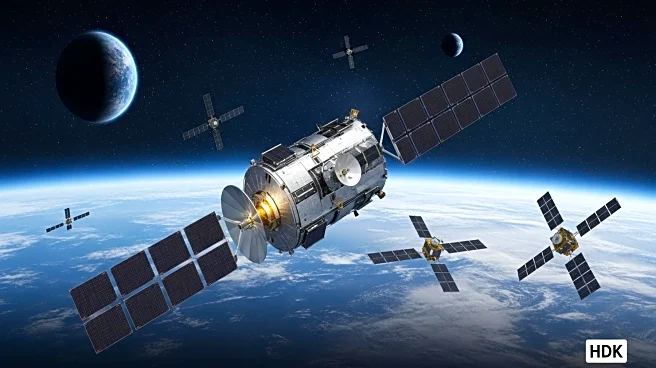What is the story about?
What's Happening?
The Space Data Association (SDA) has chosen GMV, a Spanish technology provider, to upgrade and operate its global space traffic coordination platform starting early next year. This decision comes as the U.S. Traffic Coordination System for Space (TraCSS) faces budget cuts, highlighting the need for improved space safety measures. The Space Safety Portal (SSP), which provides conjunction assessment and warning services, will be enhanced to better manage increasingly congested orbits and heightened collision risks. Currently managed by U.S. space situational awareness specialist ComSpOC, the upgraded system aims to lower barriers for operators to engage in space situational awareness (SSA) by requiring membership and data sharing. SDA's non-profit structure offers unique advantages in safeguarding sensitive data, positioning itself as a facilitator and innovation hub for global space traffic coordination.
Why It's Important?
The upgrade of the Space Safety Portal is crucial as space utilization increases, raising the risk of collisions that can create hazardous debris. By enhancing the platform, SDA aims to provide more accurate collision probability assessments and mitigate challenges posed by operators who do not share maneuver information. This initiative is significant for the U.S. space industry, as it seeks to maintain safe and sustainable operations in increasingly crowded orbits. The SDA's approach promotes a unified system where data from various SSA providers can be integrated, reducing fragmentation and improving overall space traffic management. This development is vital for satellite operators and the broader space industry, ensuring continued innovation and safety in space operations.
What's Next?
The upgraded Space Safety Portal will introduce new capabilities, including synthetic covariance generation and an open architecture to integrate data from government and commercial providers. These enhancements aim to improve latency and reduce coverage gaps, particularly during anomalies or when satellites maneuver near active spacecraft. Enhanced cybersecurity measures will also be implemented to protect member data from cyberattacks. As the SDA continues to promote data sharing among operators, the next steps involve fostering collaboration within the industry to achieve a unified global space traffic coordination system. This will require ongoing efforts to encourage operators to share data and adhere to best practices for space safety.
Beyond the Headlines
The SDA's initiative highlights the ethical and operational challenges in space traffic management, emphasizing the need for cooperation among operators to ensure safety. The non-profit structure of SDA provides a neutral platform for data coordination, which is essential for maintaining trust and transparency in the industry. As space becomes more commercialized, the role of non-profit entities like SDA in safeguarding sensitive data and promoting best practices becomes increasingly important. This development may also influence regulatory frameworks and international cooperation in space traffic management, setting precedents for future initiatives in the sector.

















